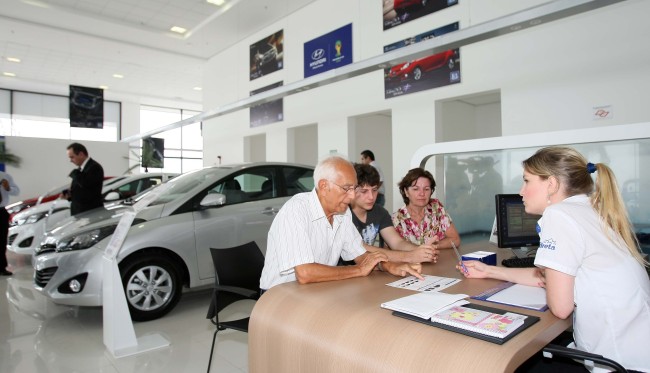 |
Customers talk with an employee at a Hyundai Motor dealership in Sao Paulo on Friday. (Yonhap News) |
Hyundai Motor is stepping up efforts to aggressively expand its presence in Brazil ― the only BRIC nation where, Korea’s largest carmaker admits, it has yet to be successful.
With the recent completion of its first Latin American plant in the region, Hyundai now aims to sell 200,000 vehicles next year, becoming one of the top five carmakers in Brazil.
“We have completed preparations for a new leap in Brazil. We will ramp up efforts to continue our success stories in India, China and Russia,” said the company in a statement.
Hyundai, which first entered the Latin country in 1992, saw a 13 percent growth in sales between 2009 and 2011, almost double the 7 percent growth of the car market during the same period.
More recently, however, the Brazilian government’s high tariffs and toughened regulations on import vehicles put the brakes on the sales momentum of Hyundai cars.
In the first nine months of this year, Hyundai suffered a 27 percent plunge in sales compared to a year ago.
Hyundai has pinned high hopes on the new factory that will help build 150,000 vehicles every year. In particular, its compact cars’ price competitiveness is expected to increase.
Completing its manufacturing presence in the BRIC nations, the company invested $600 million in the factory which is located in Piraciacaba, Sao Paulo.
And the first locally developed and produced model is the Brazil-only compact hatchback HB20, which is already gaining popularity in the market, according to company officials.
The flex-fuel model, whose sales started in October, was also recently named the Car of the Year in Brazil, just one month since its official debut there.
If Hyundai sells 26,000 HB20 vehicles by the end of the year as planned, its car sales this year are expected to reach 85,000, a turnaround after months of sluggish sales.
In order to do that, Hyundai plans to create a nationwide dealership network exclusively for HB20 and diversify the portfolio of the HB20-based cars to include sedans and SUVs next year.
Other than the compact segment, which accounts for the largest portion of Brazilian car sales, the company will import larger vehicles to better meet market demands.
By Lee Ji-yoon (
jylee@heraldcorp.com)





![[Herald Interview] 'Trump will use tariffs as first line of defense for American manufacturing'](http://res.heraldm.com/phpwas/restmb_idxmake.php?idx=644&simg=/content/image/2024/11/26/20241126050017_0.jpg)


